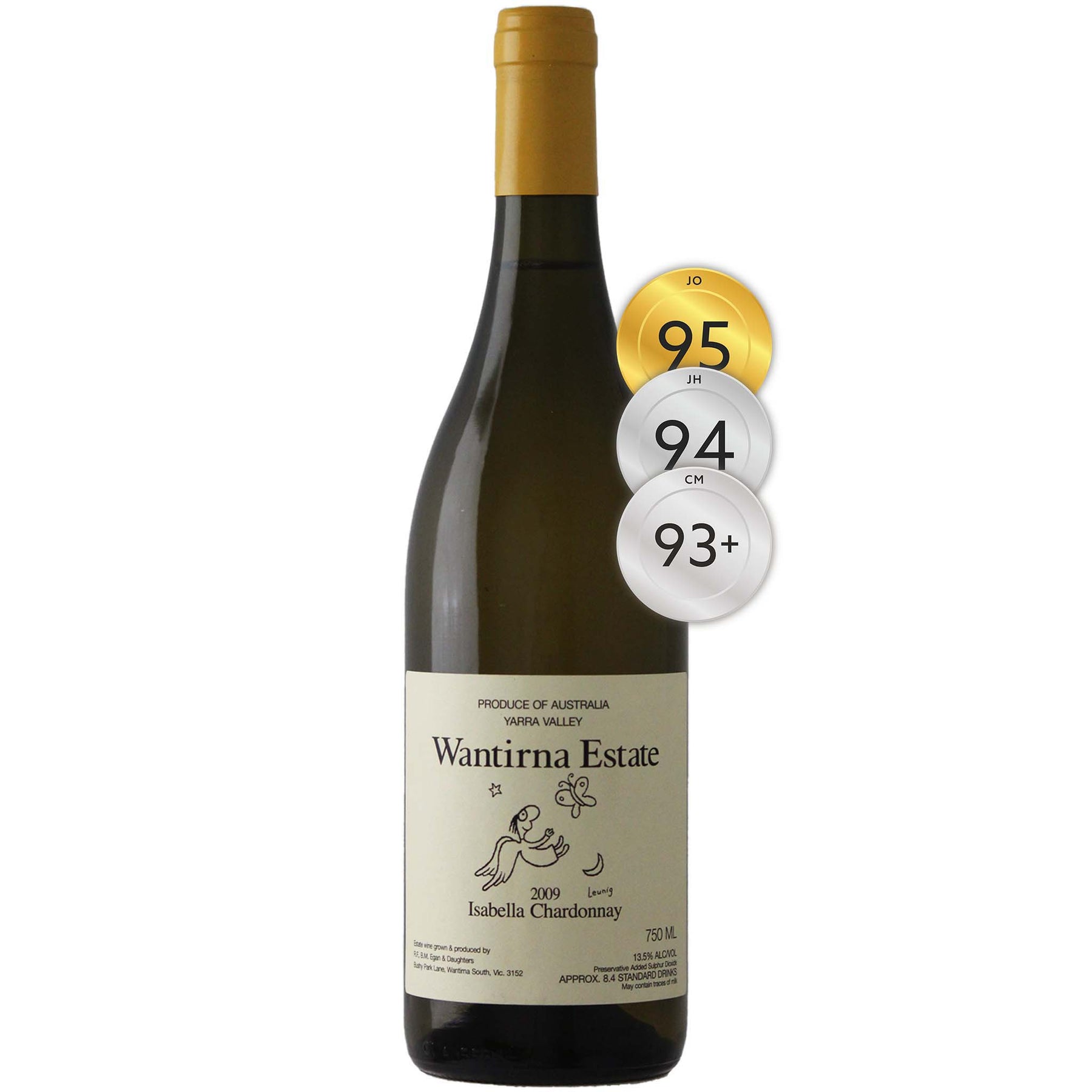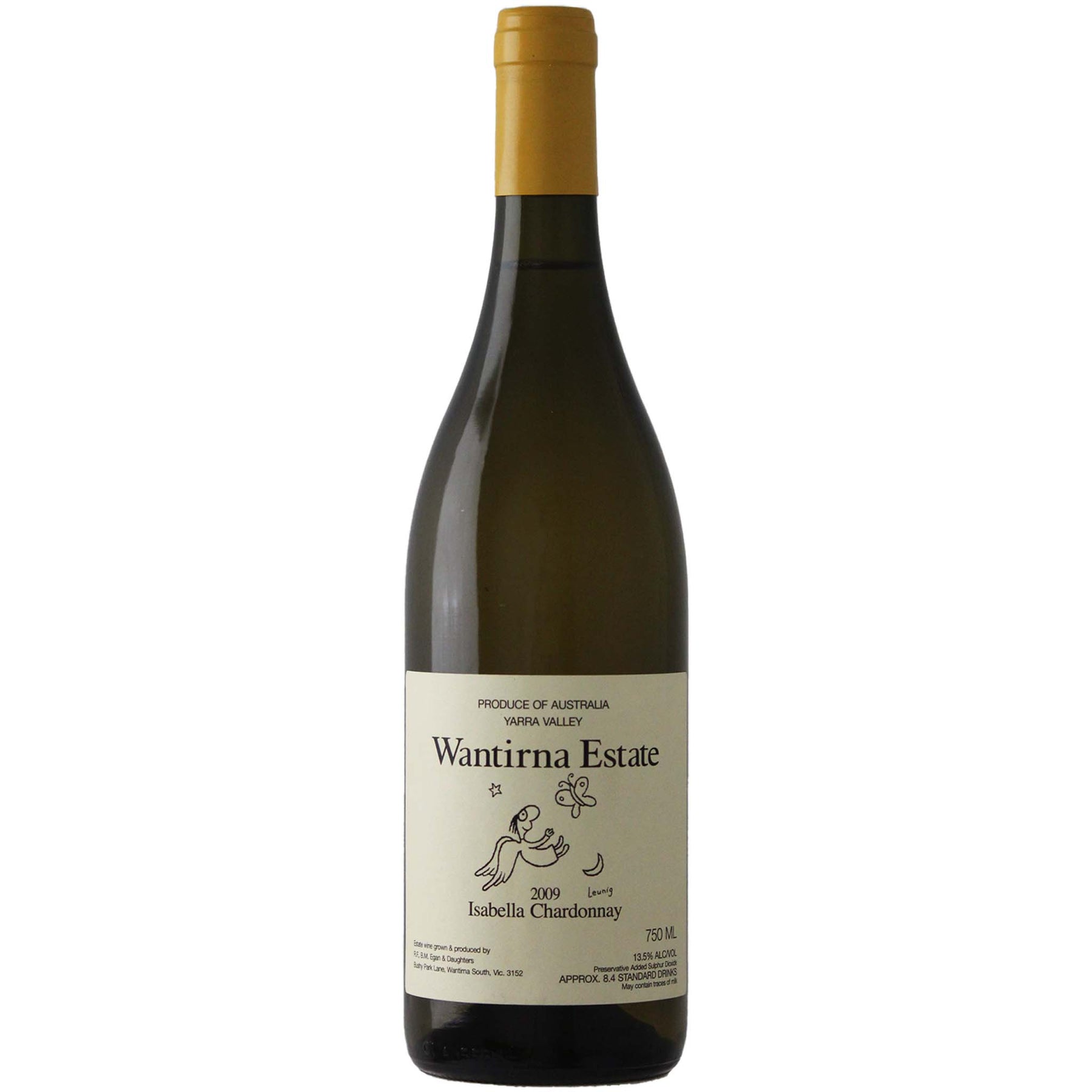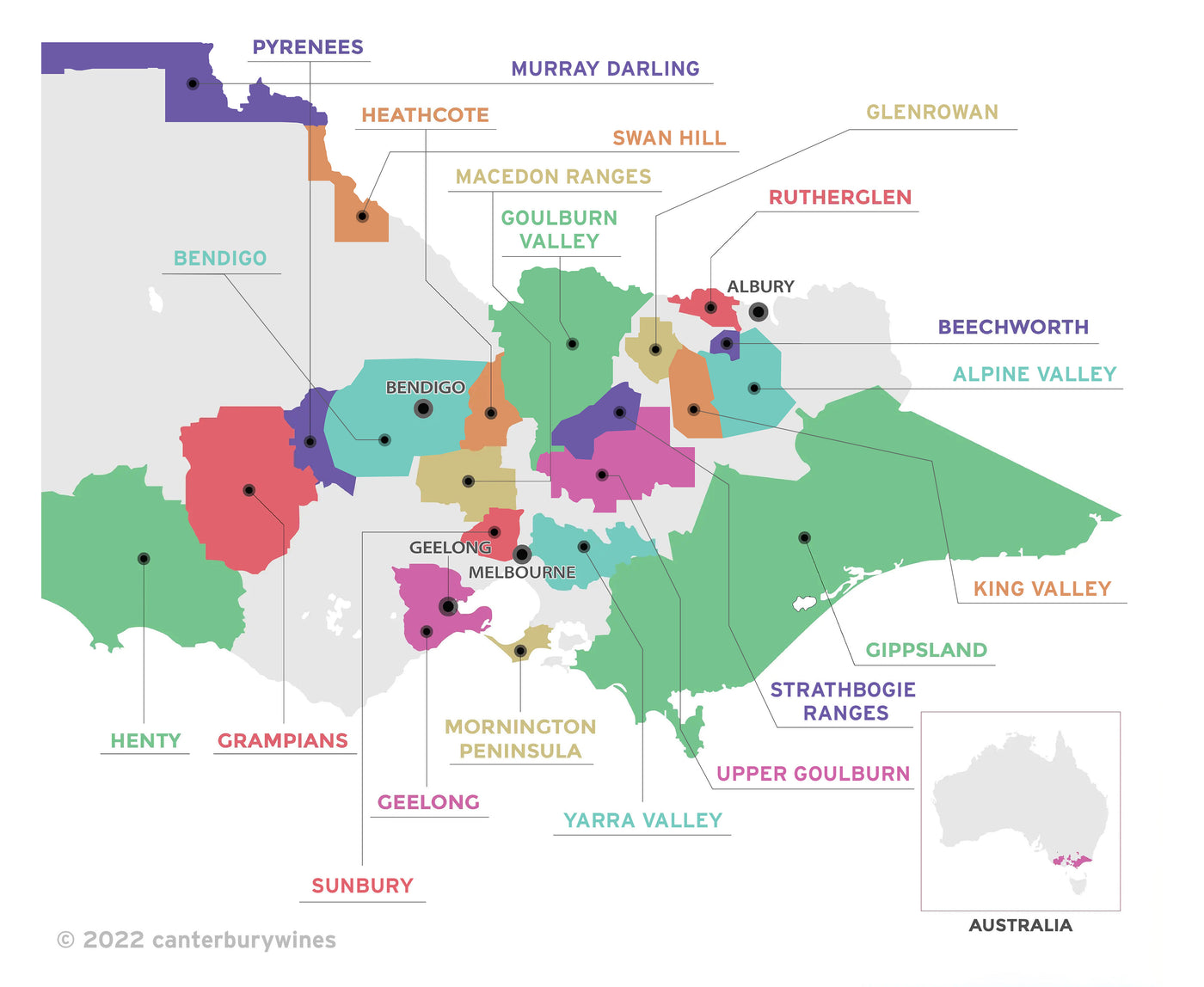

Wantirna Estate Isabella Chardonnay 2009
Style: White Wine
Closure: DIAM Cork
Wantirna Estate Isabella Chardonnay 2009
Warehouse
34 Redland Drive
Vermont VIC 3133
Australia
Critic Score: 95
Alcohol: 13.5%
Size: 750 ml
Drink by: Now
Wantirna Estate Vineyard is located just 22 km from the centre of the city of Melbourne in a suburb of the same name. It was founded by Reg and Bertina Egan in 1963. Today winemaking is a joint effort between Reg and his daughter, Maryann Egan. The father and daughter team have built a cult following for their artisanal wines.
"Expect this to build in the bottle in a Meursault-like style. Backed by notes of minerals and creamy, leesy notes, wheatmeal and waxy nuances, it's generous, ripe and juicy, with a translucently bright presence of melon and tropical fruit underpinned by a fine chalkiness. Long and tangy, it finishes with fresh lemon/grapefruit acids and a savoury aspect." Jeremy Oliver
"The chardonnay grapes are pressed in an air bag press before the juice is chilled, settled and inoculated with yeast. After fermentation begins the chardonnay must is transferred to a mixture of new and 1 and 2-year-old oak barrels. Fermentation takes place in a cool underground cellar. Our Chardonnay goes through a malolactic fermentation to varying degrees, depending on the season. The wine is left to age on the yeast lees with regular lees stirring to increase the texture of the wine. After around 11 months, the wine is fined and sent to bottle. The wine is made to be elegant with a good middle palate texture. The Wantirna Estate Isabella also blooms with time in the bottle. The 2009 Isabella is a gentle yet lively wine with a fruit structure that ties all the components together.” Wantirna Estate
Expert reviews
"Expect this to build in the bottle in a Meursault-like style. Backed by notes of minerals and creamy, leesy notes, wheatmeal and waxy nuances, it's generous, ripe and juicy, with a translucently bright presence of melon and tropical fruit underpinned by a fine chalkiness. Long and tangy, it finishes with fresh lemon/grapefruit acids and a savoury aspect. Drink 2014-2017." Jeremy Oliver - 95 points
"Glowing green-gold; a complex bouquet with barrel ferment characters evident but not dominating; the fruit is replayed on the long, well-balanced palate, with grapefruit, nectarine and cashew interwoven. Drink by 2018." James Halliday, Halliday Wine Companion - 94 points
"How much encouragement do I need to open and taste a new release of chardonnay? Exactly none. This powerful release from Wantirna Estate is a wine of presence. It's all slim-line white peach and nectarine for the most part – and boasts a nice slip of creamy, spicy oak – but as you swallow it becomes all insistent and intense. It's highly refined and yet there's something warm and showy about it too. It'll be even better once it's had time to build flesh. Drink: 2012 – 2016." Campbell Mattinson, The Wine Front – 93+ points
Reg and Maryann Egan

Winemaking is a joint effort between Reg and his daughter, Maryann Egan. These days Reg describes himself as the interfering winemaker but back in the early days everything was done by Reg, dashing from his legal practice to the winery to check on the ferments. Today much of the winemaking responsibility has been transferred to Maryann.
Maryann initially did a degree in physical education before taking off backpacking to Europe. When she ran out of money, the natural response was to go and reacquaint herself with the winemakers she'd met in her childhood. After a vintage in Burgundy, she returned to Australia to begin her Oenology studies at Charles Sturt University.
For the next six years Maryann worked at Domaine Chandon making both sparkling and table wines. After the birth of her first child Amelia in 1996, she returned to Wantirna Estate. Along with her commitment to the winery, Maryann has been a wine writer for Gourmet Traveller Wine magazine, wine editor for Donna Hay magazine and a presenter on the SBS series The Wine Lover's Guide to Australia.
The following article by Sarah Ahmed is reproduced from: https://thewinedetective.co.uk
I hadn't appreciated quite how lucky I was to visit Wantirna Estate until (a) I saw the tiny barrel cellar and (b) dropping me off at Yarra Yering, winemaker Maryann Egan was warmly greeted by top Melbourne restaurant Vue du Monde's sommelier; his annual allocation is one mixed case! I gather most of the wines are sold direct to private mail list customers who, on two Saturdays in October, are invited to the winery to pick up their wines and have a sneak preview of the new releases.
Wantirna Estate's loyal customers know what's what. These are distinguished wines from one of the Yarra Valley's pioneering modern era estates. Planted in 1963 by lawyer Reg Egan and his wife Bertina, the improbable location – almost equidistant between Melbourne city centre and Mount Mary (the next closest Yarra Valley estate) – is partly down to logistics. Reg, back then a full-time lawyer, told me the vineyard had to be near his practice in Melbourne's Mount Waverley suburb.
Of course, it wasn't the only rationale. Having studied Dr A.C. Kelly's and Francois de Castella's vintage (as in old) viticultural tomes, the young lawyer knew he wanted to plant on eastern slopes to avoid the afternoon sun and was attracted to Wantirna's thin top soil over clay. Even today, the estate's 12 acres of vines are mostly dry grown. Though the soils are similar to to Lilydale, unlike Lilydale, Wantirna is in the Dandenong Creek, not Yarra River catchment area. Vis a vis climate, Reg observed this means that Wantirna is a little more moderated by the ocean – perhaps 35 degrees during the daytime versus 37 degrees in the Yarra (as it was on the day of my visit); conversely, when it's 12 degrees in the Yarra catchment area at night, it would be 15 at Wantirna.
Foreseeability is something of a preoccupation among lawyers. Still, I wonder if Reg foresaw the re-zoning of his property and thousands of acres surrounding it as green belt. "We're the only ones left,” said Maryann, since Parks Victoria has progressively taken over the orchards which used to be all around. As if to fit in with the spirit of things, with its billiard table-like turf, hedged beds and ornamental roses, the vineyard feels like an extension of the garden to the house Reg built in 1971. In turn, the house segues into the pocket-sized winery, whose reception centre doubles as a garage. Reg was much less keen that I photograph the pylons which stride through the vineyard. They are a dissonant note to this small-scale, lovingly handcrafted operation, in which Reg (who jacked in law for wine in 1984) evidently retains a keen, green-fingered hand, though Maryann is very much at the helm.
As for Maryann, just like fellow Yarra Valley Wine Women's Sandra de Pury of Yeringberg who enjoyed a career as a chef, then consultant before succeeding her father as winemaker, the last thing Egan wanted to do was work on the family vineyard, "living in the back of beyond.” But as wine lovers know all too well, wine gets in the blood in every sense. Can it be any coincidence that, brought up on her father's fine cellar of French classics, Maryann ended up in Paris and, finding herself penniless, asked for her father's help finding vintage work?
She landed in Burgundy, working with Sophie Confuron at Domaine J. Confuron and, the very next year, signed up to study viticulture and oenology by correspondence at Charles Sturt University, Wagga Wagga. Though she held out from returning home for several years, doing a vintage at Tyrrell's, a short ("hated it”) stint in wine retail and working as an assistant winemaker at Domaine Chandon up the road, in 1996 she joined her father at Wantirna, following the birth of her first child.
Joking that they've always been on trend, Maryann confirmed all Wantirna's wines are single vineyard, the Cabernet Sauvignon is a field blend (the vineyard is interspersed with Merlot and Cabernet Franc) and they've always fermented in cement tanks. "We're small enough to do it all” she added, "with total control."
About the winery

Wantirna Estate Vineyard is located just 22 km from the centre of the city of Melbourne in Victoria, in a suburb of the same name. It was founded by Reg and Bertina Egan in 1963 and was the first of the new generation vineyards planted outside the region of the Yarra Valley. Reg was a lawyer and the vineyard was a hobby.
The early plantings were a bit of everything as Reg thought that the vineyard would be an experimental site and that he would have to move to another location as the suburbs continued to spread. So, he planted a bit of a fruit salad to see what performed best - the classics like Chardonnay, Cabernet Sauvignon and Merlot, but also a mixed bag of the Italian and Spanish varieties Grenache, Pedro Ximenes, Shiraz, Crouchon, Barbara and Malbec. As the vines produced grapes, he gradually assessed their performance and replaced them with the varieties that did well in the cool climate.
It wasn't until 1985 that Reg gave up being a Barrister to focus solely on viticulture and winemaking. By this time the vineyard had been consolidated to Pinot noir, Chardonnay, and the Bordeaux varieties of Cabernet Sauvignon, Merlot and Cabernet Franc. Petit Verdot was added in 1989.
Today winemaking is a joint effort between Reg and his daughter, Maryann Egan. Reg now describes himself as the interfering winemaker and most of the winemaking responsibility has been transferred to Maryann. Maryann studied oenology at Charles Sturt University and then worked at Domaine Chandon for six years making both sparkling and table wines. After the birth of her first child Amelia in 1996, she returned to Wantirna Estate.
The father and daughter team have built a cult following for their artisanal wines - 'Hannah' Cabernet Franc Merlot, 'Amelia' Cabernet Sauvignon Merlot, 'Lily' Pinot Noir and 'Isabella' Chardonnay.
"We look to have the vineyard site shine. To not overdo the oak, or fiddle too much. We don't lees stir our Chardonnay, basically we ferment the juice in barrel and leave it alone. We use 25% or less new French oak, oak should be the nuance in the background, rather than the main event. The Pinot Noir we destem and then ferment, without the stalks. The whole bunch character – I've tried a portion in the past – doesn't suit our site. We like the Pinot fruit to shine, to show the place where it was grown, and to have a nice backbone of tannin. The Cabernet blend is similar. A touch more new oak – around 30% as that really balances the beautifully ripe character we get. Tasting the Cabernet grapes is one of the most important vineyard and vintage time decisions. It's important to get past that herbaceous character, but to pick before the grapes get too ripe and lose their ‘cabernetness'. Overall, we use a light hand on our winemaking, and let the vineyard do the talking." says Maryann.
Wantirna gradually renamed their wines to include the names of their four granddaughters. They also got Michael Leunig, famous cartoonist, artist, satirist and social commentator, and a friend of Reg's, to illustrate the labels which depict something about each of the girl's personalities.

Victoria
Victoria is home to more than 800 wineries across 21 wine regions. The regions are Alpine Valley, Beechworth, Bendigo, Geelong, Gippsland, Glenrowan, Goulburn Valley, Grampians, Heathcote, Henty, King Valley, Macedon Ranges, Mornington Peninsula, Murray Darling, Pyrenees, Rutherglen, Strathbogie Ranges, Sunbury, Swan Hill, Upper Goulburn and Yarra Valley.
Victoria's first vines were planted at Yering in the Yarra Valley in 1838. By 1868 over 3,000 acres had been planted in Victoria, establishing Victoria as the premier wine State of the day. Today, the original vineyards planted at Best's Wines are among the oldest and rarest pre-phylloxera plantings in the world.
Victoria's climate varies from hot and dry in the north to cool in the south and each wine region specialises in different varietals. For example, Rutherglen in the north is famous for its opulent Muscats and Topaque and bold reds, while the many cooler climate regions near Melbourne produce world class Chardonnay and pinot Noir. Victoria is truly a wine lover's playground.
